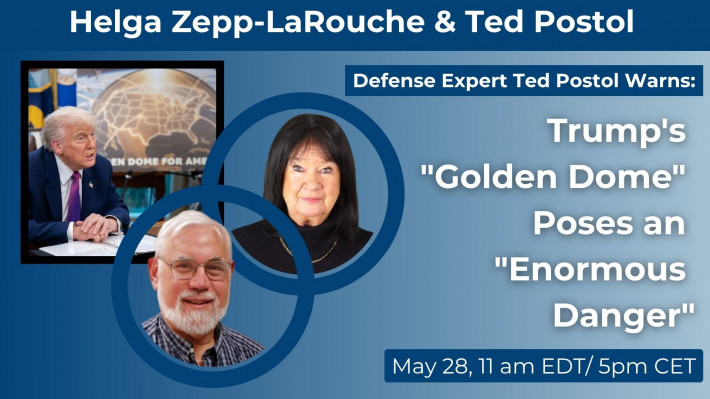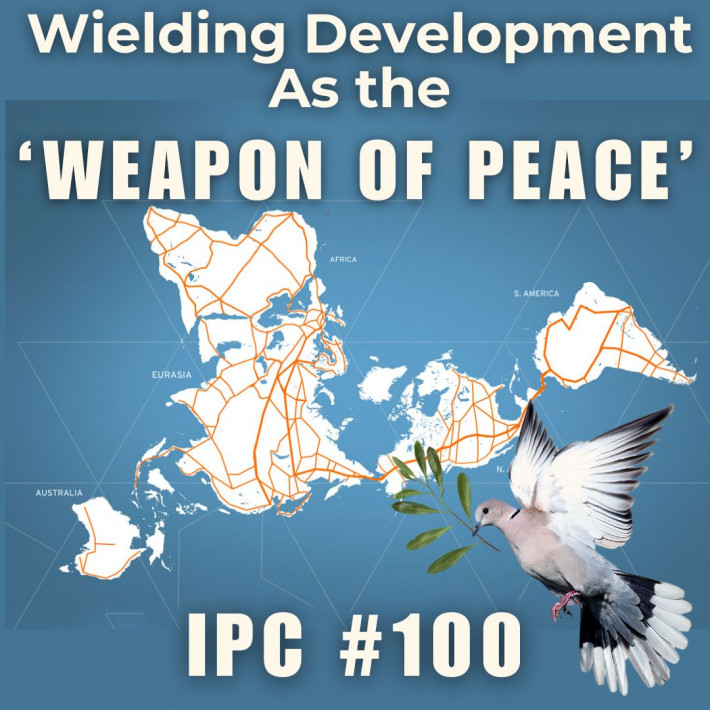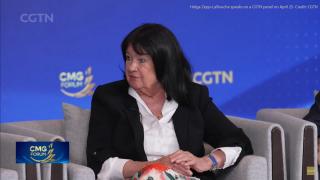May 22– The Schiller Institute today released the names of 85 prominent endorsers of the Institute’s Open letter to Pope Leo XIV from all over the world, as a spur to broader circulation of the Letter, and the addition of many further endorsers. These names come from over 600 current total signers. The Institute stresses the urgency of this effort, in light of the unimaginable civilian death toll and suffering in Gaza as the Israeli government’s policy of genocide and ethnic cleansing intensifies, and other conflicts, such as that in Ukraine, which continue to menace humanity with the specter of nuclear war. The letter is translated into Spanish, French, German, Swedish, Arabic, and Portuguese.
The Schiller Institute letter states, “We the undersigned, wholeheartedly welcome your Holiness to your Pontificate in these present extremely turbulent times, and we appreciate the fact that your first words were ‘Peace be with all of you.’
“Not only are regional conflicts raging in many parts of the world, but several of those conflicts have the potential of escalating to nuclear Armageddon, which could end civilization, and would thus be the ultimate sin against God’s creation.
“You have offered to facilitate peace talks among countries at war, continuing the mandate of Pope Francis, who had made peace an urgent demand in his last Urbi et Orbi message, and continuously denounced the arms trade, as well as those who profit from war.
“We wish to communicate to your Holiness our commitment to try everything in our power, to reach out to all Christians, as well as believers of other religions and world outlooks, to unify in an effort to establish a true peace order in the world, one which eliminates the real causes for war by taking into account the valid security interests of all parties.
“But, given the horrendous, satanic genocide going on in Gaza, and the unforgivable silence and inaction on the side of the governments in face of it, we also appeal to you to speak out on this ongoing genocide. We need a moral authority to condemn this genocide. Without that, we will lose any moral compass whatsoever.
“We also fully support your rejection of the ‘Manichaean notions’ that divide people into ‘good and evil,’ because such notions deny people the chance to overcome evil through development. But that requires the mobilization of our free will, and it does not mean an automatic acquittal of those who decide to be the instrument of evil.
“We support the idea that ‘the new name for peace is development!’”
The five initiating signatures:
- Helga Zepp-LaRouche (Germany), Founder of the Schiller Institute and co-initiator of the International Peace Coalition (IPC)
- Ray McGovern (United States), Former CIA analyst, co-founder of Veteran Intelligence Professionals for Sanity (VIPS)
- Liliana Gorini (Italy), Chairwoman, Movimento Solidarietà (Movisol)
- Anastasia Battle, (United States), Co-initiator of the International Peace Coalition (IPC)
- Jacques Cheminade (France), former French presidential candidate, President of Solidarité et Progrès,
The listing of a first group of 85 prominent additional signers released today, organized alphabetically by country, and alphabetically by last name within country. Profession, title and/or affiliation, for identification purposes only
- Daud Azimi, Afghanistan/Germany, Engineer; Board Member, Peace National Front of Afghanistan
- Tse Anye Kevin, State55 Afrika, Acting President
- Enrique Juan Box, Argentina, journalist
- Roberto Fritzsche, Argentina, Professor, Department of Economics, Universidad de Belgrano
- Rubén Darío Guzzetti, Argentina, Professor, Argentine Institute of Geopolitical Studies
- Juan Francisco Numa Soto, Argentina, Legal advisor, Yacyretá Binational Entity; former Professor of Constitutional Law, Universidad de Buenos Aires.
- Carlos Perez Galindo, Argentina, Lawyer
- Meinrad Schneckenleithner, Austria, Pax Christi
- Gen. (ret.) Edwin Alfonso De La Fuente Jeria, Bolivia, Former Commander-in-Chief, Bolivian Armed Forces
- Paulo Cannabrava Filho, Brazil, journalist; founding director, Diálogos do Sul
- Jairo Dias Carvalho, Brazil, Professor of Philosophy of Technology, University of Uberlândia
- Dimitri Lascaris, Canada/Greece, Lawyer, Activist; 2025 Serena Shim laureate award for integrity in journalism; host, Reason to Resist podcast
- H. Douglas Lightfoot, Canada, Mechanical engineer (ret.); founder, Lightfoot Institute
- Juan Gómez, Chile, Coordinator, World Without War and Without Violence
- Vincenzo Romanello, Ph.D., Czech Republic/Germany/Italy, Nuclear engineer; founder, Italian chapter, “Atoms for Peace“
- Tom Gillesberg, Denmark, President, Schiller Institute Denmark; former independent candidate for parliament
- Alcibíades Abreu, Dominican Republic, University Professor, School of Mathematics, Universidad Iberoamericana (UNIBE) and Universidad Católica, Santo Domingo
- Ramón Emilio Concepción, Dominican Republic,Attorney at Law; Presidential Pre-candidate, PRM party (2020)
- Marino J. Elsevyf Pineda, Dominican Republic, Attorney at Law; notary
- Arsenio Hernández Fortuna, Dominican Republic, Director, El Diario Antillano newspaper
- José Rodríguez Portorreal, Dominican Republic, President, Solidarity Party
- Ernesto Pazmiño Granizo, Ecuador, Human rights lawyer; university professor; former Minister of Justice and Human Rights, Ecuador; former vice-president, Justice Center of the Americas.
- Mariano Nguema Esono Medja, Equatorial Guinea, Focal Point in Equatorial Guinea, United Nations Regional Center for Peace and Disarmament in Africa
- Col. (ret.) Alain Corvez, France, consultant, international strategic affairs; former advisor to Commandant of UN Interim Force in Lebanon (UNIFIL)”;
- Jean-François Geneste, France, business CEO
- Ali Rastbeen, France, President, Académie de Géopolitique de Paris
- Joachim Bonatz, Germany, Vice President, East German Board of Trustees of Associations (Ostdeutsches Kuratorium von Verbänden e.V.), Berlin
- Magret Bonin, Germany, Global Women for Peace United Against NATO
- Holger Hüttel, Germany, Chairman, local branch of Die Linke, Sangerhausen
- Sabiene Jahn, Germany, Independent Journalist, Koblenz: In Dialogue
- Dr. Takis Ioannidis, Greece, Co-Founder, Global Gandhian Harmony Association; Dr. Litt., poet, writer
- Raúl Aníbal Marroquín Casasola, Guatemala, Coordinator, Citizen Observatory for Peace “La pupila del cielo” – Human and Environmental Rights Defender.
- H. E. Donald Ramotar, Guyana, former President of Guyana
- Koushik Das, India, Journalist
- Mauricio Abbate, Italy, Chairman, National Institute for Cultural Activities (ENAC)
- Gaetano Santoro, Italy, trade unionist
- Marino Savina, Italy, National chairman ANDICOSI, Italian Association of Security Workers
- Alessia Ruggeri, Italy, trade unionist
- Tatjana Ždanoka, Latvia/Belgium, Former Member, European Parliament; Ph.D., Mathematics
- Bassam el Hachem, Lebanon, Professor of Political Sociology; researcher
- Chandra Muzaffar, Malaysia,Founder and Director, International Movement for a Just World (JUST)
- Driss Larafi, Morocco, Professor of Political Science and International Relations, Ibn Tofail University
- Kees le Pair, Ph.D., Netherlands, Physicist, Univ. of Leiden; former Ass’t Professor, American University of Beirut; Science Advisor, Dutch Military Research
- Adewale Aiyedun, Ph.D., Nigeria, Forensic Investigator, Audit & Security Consultant
- David Ajetunmobi, Nigeria, trade union leader, auto sector
- Shamsudeen Hassan, Nigeria, Founder, Yhunich Mentors Academy – Advocates for Youth Development
- Adeshola Kukoyi, Nigeria, Founder, Equilibrium Persepctives, University of Lagos
- Archbishop Theodosios Atallah Hanna, Palestine, Greek Orthodox Patriarchate of Jerusalem
- Yorel Kira Alcarraz Aguero, Peru, Congresswoman, Congress of the Republic of Peru
- Luis Mora, Peru, President, Peruvian chapter, “World without war and without violence”
- Fabiola Morales, Peru, President, Cooperation and International Relations Commission, Municipality of Lima. First Councilwoman, Lima.
- Roberto Vela Pinedo, Peru, Former National Dean, College of Economists of Peru
- Georgy Toloraya, Russia, Executive Director, Russian National Committee on BRICS Research; concurrently Director, Asian Strategy Center, Institute of Economics and Chief Researcher, Institute of China and Contemporary Asia, Russian Academy of Sciences
- Earl M. Bousquet, St. Lucia, veteran Caribbean journalist
- Hussein Askary, Sweden, Southwest Asia coordinator, Schiller Institute
- Ulf Sandmark, Sweden, Chairman, Schiller Institute Sweden
- Erich Fankhauser, Switzerland/Germany, Peace Through Culture e.V. (Frieden durch Kultur e.V.)
- Prof. Dr. iur. et phil. Alfred de Zayas, former UN Independent Expert on International Order, Geneva, Switzerland
- Bernie Holland, United Kingdom, musician; antiwar activist
- Mohammad Salim Akhtar, United States, National Director, American Muslim Task Force on Civil Rights and Elections
- Archbishop Vicken Aykazian, United States, Vice Moderator, Central & Executive Committee, World Council of Churches; Board & Executive Committee Member, National Council of Churches; Diocese of the Armenian Church of America
- Fatmeh Atieh Bakhit, United States, Publisher/Editor, Al Enteshar Al Arabi newspaper
- Col. (ret.) Richard H. Black, United States, former Virginia State Senator; former head of U.S. Army’s Criminal Law Division, Pentagon
- Nelson Borelli, United States, Professor of Psychiatry (ret.), author, teacher
- Charles Borowsky, PH.D., United States, musician, educator; President, Intermuse Performing Artists Bureau
- Fr. Harry Bury, United States, Twin Cities Non-violent; U.S. Catholic Priest Association
- Dr. James C. Cobey, MD, United States, Founder, Health Volunteers Overseas; Steering Committee, Voices from the Holy Land; as part of work with Physicians for Human Rights, shared 1997 Nobel Peace Prize with International Campaign to Ban Landmines coalition
- Joseph J. Fahey, United States, Co-Founder, Pax Christi USA; author, teacher, theologian
- Christopher and Mary Fogarty, United States, Author, “The Perfect Holocaust: Ireland 1845-1850”; Chicago Ireland Support
- Graham Fuller, United States/Canada, Former U.S. diplomat and CIA official; former Vice-Chair, National Intelligence Council
- Jack Gilroy, United States, Veterans for Peace; Pax Christi – Upstate NY; Pax Christi International
- Joyce Hall, United States, Coordinator, Pax Christi, Dallas chapter
- Nydia Leaf, United States, Granny Peace Brigade
- Marie-Noelle Lombard, United States, United National Anti-War Coalition (UNAC)
- Martin Melkonian, United States, Adjunct Associate Professor of Economics, Hofstra University; Treasurer, Long Island (NY) Alliance for Peace and Justice
- Lt. Col. (ret.) Earl Rasmussen, United States, international consultant
- Coleen Rowley, United States, Retired FBI agent; former Minneapolis Division Legal Consel, 9/11 whistleblower; member, Veteran Intelligence Professionals for Sanity (VIPS); First recipient, Sam Adams Award for Integrity in Intelligence.
- Diane Sare, United States, President, The LaRouche Organization
- John Shanahan, United States, Civil engineer; president, Go Nuclear Inc.; editor, website: allaboutenergy.net
- John Steinbach, United States, Hiroshima Nagasaki Peace Committee, National Capital Area
- Dr. Mohammad Toor, United States, Chairman, Board of Trustees, Pakistani-American Congress
- Father Joseph Varghese, United States, Executive Director, Institute for Religious Freedom and Tolerance; Holy Sophia Coptic Orthodox Church School of Theology
- René Wadlow, United States/France, President, Association of World Citizens
- Alan Waltar, Ph.D., United States, Former president, American Nuclear Society; former head, nuclear engineering, Texas A&M University; consultant, IAEA, DOE
- Jim Wohlgemuth, United States, Veterans for Peace, Nashville (TN) chapter; radio host
- Luisa Beatriz Báez Catarí, Venezuela, Secretary of Organization, Diocesan Union of Confraternities of the Most Holy Sacrament of the Altar Guarenas
- Munashe Chiwanza, Zimbabwe, civil engineer
- Ahmed Bassalat, Ph.D., Professor of Physics, CERN associate

























